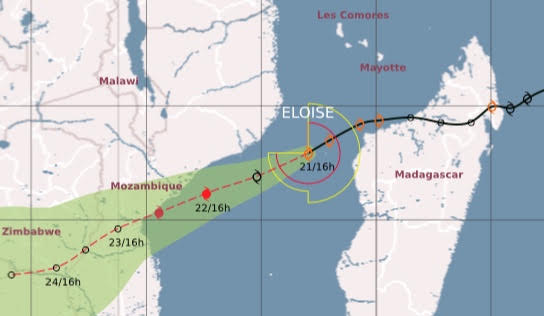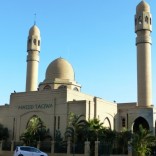Mozambique: Chapo praises the excellence of the Aga Khan Academy and advocates the expansion of the ...
Mozambique :Cyclone Eloise to hit Beira Sat am; Total CEO meets Nyusi; Covid-19 cases and deaths doubling every 7 days – By Joseph Hanlon

Image: Voa Portugues
- Cyclone Eloise to hit Beira Saturday morning
Tropical storm Eloise will become a full cyclone tomorrow (Friday 22 Jan) and hit Beira early Saturday with sustained winds of 110-120 km/h, according to predictions early today. This afternoon the national meteorological office increased its projection of the intensity of the storm, predicting wind up to 150 km/h with gusts up to 170 km/h and rainfall above 200 mm.
The storm passed across the north of Madagascar Tuesday and is picking up water and energy as it moves across the warm Mozambique Channel. Heavy rains could affect the already flooded Buzi and Pungue rivers, both 2 m above flood level this morning, and Buzi town, already cut off by the flooded rivers. Buzi flooding yesterday – before the arrival of Eloise – is shown in a video by Gabriel Chibota on http://bit.ly/BuziFlood1
These are predictions. The cyclone had been predicted to make landfall at Vilankulos Friday but has already changed course and has also slowed down, which means an increase in intensity as is picks up energy from the Mozambique channel. Winds up to 60 km/h are predicted to go down the coast as far as Vilankulos. During Friday Eloise could change course and intensity again.
Beira port will be closed from midnight tonight (21/22 Jan) until Sunday morning.
The prediction from Windy.com for midnight Friday/Saturday is below.
The strongest winds are east (right) of the eye of the storm, over 130 km/h, and in the large blue zone east and south winds are 75-100 km/h. https://www.windy.com/?2021-01-23-00,-19.738,35.593,7
This is both the track and prediction from Meteo France in Reunion.
http://www.meteo.fr/temps/domtom/La_Reunion/webcmrs9.0/anglais/index.html
The other good predictor/tracker is https://www.metoc.navy.mil/jtwc/products/sh1221.gif with wind speed given in knots (1 knot = 1.85 km/h)
We post the daily river and flood reports Boletim Hidrológico Nacional on http://bit.ly/Moz-flood21 and we have also started posting UN reports there as well, including OCHA Eloise Flash Updates.
- Total head meets Nyusi, who again promises protection
Total chair and CEO Patrick Pouyanne flew in to meet President Filipe Nyusi Monday (18 Jan) to demand better protection for the Afugi gas project. For at least the third time, the presidency announced “it was agreed that a security plan should be established to ensure the smooth implementation of the project.” This was what was also agreed between Total and the government on 24 August 2020 and Pouyanne clearly flew to Maputo to tell Nyusi personally that it was not happening.
And the visit had some impact. Two days later at the ceremony to install the new Defence Force Chief of Staff Eugenio Mussa and deputy chief Bertolino Capetine, President Nyusi told them to “pay special attention to the Afungi peninsula.” He said they were named to their posts to impose “sharpness, dynamism and effectiveness” and improved “organisation and combativeness”, adding that the military “is not built with improvisations.” (O Pais 21 Jan)
Three weeks ago when insurgents reached the gates of the gas project on the Afungi peninsula, Total evacuated most of its staff from the site and stopped work.
Total is dependent on government military forces for protection because it does not use armed security companies, according to the company’s head of exploration and production for sub-Saharan Africa, Nicolas Terraz. Total does work with several security companies whose guards are unarmed. In August, the company had contracts in Mozambique with the British security consultancy firms Blue Mountain and Control Risks, as well as with the global security companies GardaWorld (Canadian), G4S (British), and the Mozambican Arkhe Risk Solutions. (Zitamar 19 Jan)
Total investment in Area 1 including exploration, drilling and building the very expensive gas liquification plants on the Afungi peninsula is estimated at $23 bn, one of the largest investments in Africa. Area 1, the half of the gas field closest to the Cabo Delgado coast, is operated by Total of France, with a holding of 26.5%. The other members of the consortium are Mitsui of Japan (20%), PTTEP of Thailand (8.5%), the Indian companies ONGC Videsh Rovuma, Beas Rovuma Energy Mozambique and BPRL Ventures Mozambique (10% each) and Mozambique’s own National Hydrocarbon Company, ENH (15%) (AIM 20 Jan)
2,533 people have been killed in the Cabo Delgado civil war since October 2017, according to Cabo Ligado (11-17 Jan).
Covid-19 cases and deaths doubling every 7 days
Covid-19 cases and deaths are doubling every week. These are seven day averages of daily deaths in the week to Wednesday: 6 Jan – 1 death per day; 13 Jan – 4 deaths per day; 20 Jan – 9 deaths per day.
These are average daily new cases in the week to Wednesday: 6 Jan – 169 new cases; 13 Jan – 579; 30 Jan 810.
There were 829 new cases and 12 deaths reported today (Thursday 21 Jan).
Comment Will this trigger middle class worries?
One of Frelimo’s essential successes has been to keep the Maputo middle class satisfied, and thus able to ignore the war in Cabo Delgado, greed and poverty. The middle class sends their children to private schools and uses private health facilities, and has cars (even if only second hand imported Japanese ones) and water tanks to cover water rationing, as well as generators in case of electricity cuts – thus able to pump water into the tanks. So the Maputo middle class is not affected by declining quality of education or the increasing water shortages.
But in the past week the number of Covid-19 cases hospitalised in Maputo city has jumped from 120 to 192, with 51 people admitted to hospital in Maputo in the 24 hours to this morning. Both private and public hospitals are now full. Maputo central hospital has to put up tents for Covid-19 patients.
“Have you noticed that elites, including political leaders, are being ravaged by Covid 19? That these elites cannot find beds in private sector clinics? That these clinics are charging astronomical sums in deposits, up front (another deregulated jungle, this one)?,” asks Marcelo Mosse, editor of Carta de Mocambique.
Will the Maputo middle classes suddenly notice that in a pandemic their health and survival depends on a public sector, which they have allowed to be run down, assuming only the poor would suffer.
By Joseph Hanlon














Leave a Reply
Be the First to Comment!
You must be logged in to post a comment.
You must be logged in to post a comment.